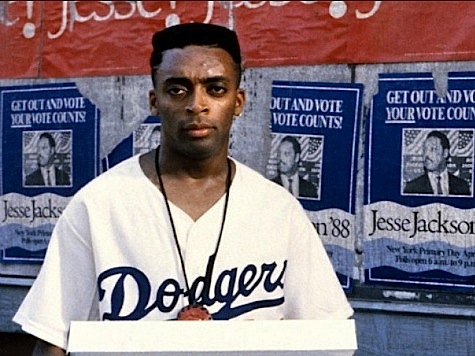
by Michael Angelo Tumbarello aka Baje One.
He’s mad. Now some of you are mad. Now I’m mad that you’re mad.
I need to chime in here. As many of you already heard, on Tuesday Spike Lee delivered an eloquent and angry treatise against gentrification in his hometown of Brooklyn (see way down below for the audio interview). Anyway, a friend posted the link on the facebook, and I listened, and I laughed my ass off. I also identified strongly with Mr. Lee – what he’s saying is funny to me because it’s true to me. As someone who grew up in Brooklyn and who saw his own neighborhood change drastically through the process of gentrification, I can relate to the anger and frustration in his message. As a white man my perspective is fundamentally different – my neighborhood flipped over the course of my lifetime and filled up with people who look (more or less) like me, while the opposite is true for Spike Lee and millions of other people of color who were born and raised in NYC, a place where every year more and more non-white, non-rich people are being pushed to the (literal) margins of this town.
So yeah. I’m white and Spike Lee is black. Duh. But when I hear him speak I feel like we are on the same team, and I guess that’s what I really want to say here. Everything he said in that speech, I’ve said myself during conversations with friends and family about the state of our fair city. If you don’t believe me, just ask my wife about how many “rants” she’s had to endure. Why? Because “Christopher Columbus syndrome” is a real fucking thing, and many newly arriving white people in Brooklyn seem to be experiencing this disease in its advanced stages.
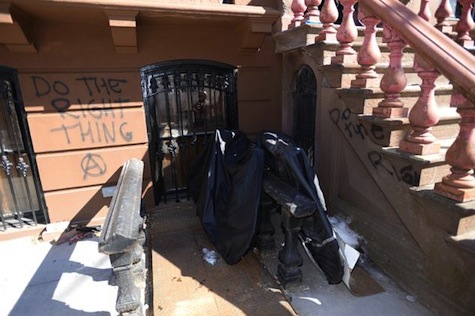
As many of you may also have read, Spike Lee’s former Fort Greene home and the neighboring building were both vandalized on Thursday, clearly in response to the gentrification comments that Lee made during the “rant.” (I’m putting that word in quotes because it’s a fucked up word that the media likes to use to simplify people and their viewpoints. It’s a word that often takes people’s LEGITIMATE, HONEST, WELL-DESERVED anger and trivializes it. This trivialization is a thing that the American media loves doing to people who are either a) not white b) not rich c) not Christian d) not straight etc. etc. etc and the list goes on.
A quick google search for “Spike Lee rant” yields an untold amount of white backlash, so much so that I’m surprised to see that a broken window and a little graffiti were the only immediate responses to Mr. Lee’s comments. God willing there won’t be any further reprisals. But this heap of backlash raises some serious questions: “Can’t he just be angry? Can’t he just be angry without our (white people’s) permission? And why can’t we just accept his frustration as being legitimate and worthy of our serious consideration?”
I know, I know, people write entire books in trying to answer these questions, and I have plenty of theories of my own. But I guess what I want to say here is – if you’re mad at Spike Lee then you should be mad at me too. Because the way he feels is the way I feel. If you hate him, then you should hate me too. But it won’t be simple for you. You can’t hate me just because I’m black, because I, my friends, am as white as the day is long. You’ll need another reason.
Those of you who live in Brooklyn but are not from here ought to know that those of us who WERE born here often have to go on serious and extensive personal journeys in learning how to not want to constantly punch all of you in the face. In all seriousness, I would like to thank all of you personally for leading me towards the spiritual concepts of radical acceptance and love for all mankind. That said, sometimes I want to put a fucking brick through the window of the newest store in my neighborhood that was opened by a trustfund baby from Oregon that sells artisanal fucking whatever the fuck for prices that I could never possibly afford to people who look like they’ve never ever ever in their frail and privileged lives had to respond to the word “No.”
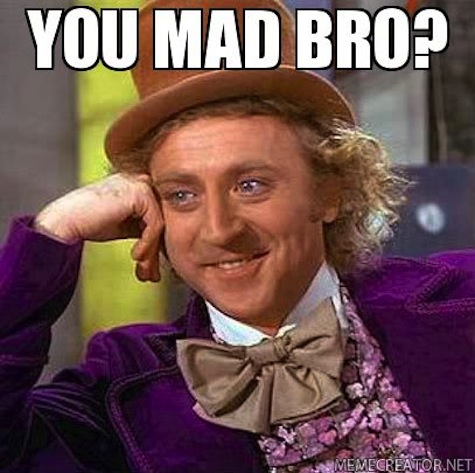
Forgive me. That was out of line. But the thing is, it be’s like that sometimes. Anger happens. Are you interested in knowing more about why I’m mad? If so, continue on. If not, thanks for making it this far, please don’t tag up my stoop and please leave my neighbors out of this.
I’m mad because I’m tired of white people from out of town who assume that we are on the same team. If you don’t think Spike Lee is on to something, I beg to differ. He complains that white people like to come into neighborhoods, act like they’ve “discovered” the place, and then start working to change the culture immediately with little or no respect for the way things were. I’ll offer a simple example from a party I was at recently that illustrates this point.
I meet this white guy, a friend of a friend, and we start talking. He’s not from Brooklyn. I ask where does he live. Bushwick. “Oh,” I say, “I like it out there. I have some friends out there.” The guy leans in, he’s a little tipsy, and he says “I like it ok. I could deal without all the colorful murals dedicated to dead drug dealers though.”

Damn homie. Did you ever consider that maybe those “drug dealers” weren’t drug dealers? Did you ever consider that painting a colorful mural might be a way to birth something beautiful out of the seemingly senseless tragedy of losing a friend or family member so prematurely? Did you ever consider the contribution that those splashes of color make to the lives and psyches of people who grow up and live in a place as extremely urban as Bushwick? Have you ever considered the basic notion that public space means different things to different people?
I didn’t say any of this, and my silence that night and on other nights is probably why I’m writing this now. What I did: I wrapped that conversation up and walked away. After all, I came out to have a good time, not to civilize this guy. But damn, the thing is – I hear shit like that ALL THE TIME from white people who think that because we both have flannel shirts on that somehow that means we are on the same team. From now on, please don’t whisper your white secrets to me.
Another quick example. My friend Shaka, a former student of Spike Lee’s in fact, recently made a movie called Newlyweeds. If you haven’t seen it, you really should, it’s on Netflix. It’s a dark and funny love story, a meditation on the tragic comedy of chemical dependency, and it all takes place in Brooklyn. It was written and directed and edited and scored etc. by people from Brooklyn. I remember reading reviews when it first premiered, and I remember one review in particular that criticized the film for not engaging with “white Brooklyn”. It seemed that the writer was incensed at the notion that anyone could tell a story about Brooklyn without the story being about “the new (white) Brooklyn.” The implication is that the culture of Brooklyn is something that has to be brought in from the outside, that culture has to be imposed. That said, Spike Lee’s comparison between gentrification and colonization/imperialism makes perfect, logical sense to me.
Listen, don’t get so defensive. It’s not your fault. It’s not my fault. It’s none of our faults for being ignorant to other people’s perspectives. HOWEVER, it IS very much our fault if we remain ignorant in the face of ideas that allow us the opportunity to escape from the prisons of our own limited perspectives by embracing the ideas of people who come from different walks of life.
Gentrification is nothing if not a highly complex issue. Another friend of mine, Avi, was recently interviewed on NPR as the face of the new “median class”, those people who are living in families making the city’s median income. My friend and his wife (both white) recently moved to Brooklyn from Nashville, and they got a nice floor-through apartment in Bed Stuy. In the interview my friend speaks honestly about his situation. Him and his wife pay $2000 a month in rent. They live a pretty modest lifestyle, they occasionally splurge on a nice meal at a restaurant, and at the rate they are earning/saving and the direction of the housing market, they will never be able to afford to buy a house in Bed Stuy, as much as they would like to.

Here’s one way this could go, based on what I saw happen in Park Slope: My friends will participate in the process of gentrification. Their presence will encourage more white people to move on to their (mostly black) block. Coffee shops, grocery stores, bars, venues, and other businesses will open up that cater to the new white residents. Train service will improve. The police and other government officials will pay more attention to the area. Potholes will disappear sooner. The schools will get better. Blocks will be designated as historic districts. Old buildings will be ripped down. Condos will come up. Tenants paying “old market” rents will be forced out through landlord neglect. And one fine day, my friends will look left and look right and all their neighbors will be white people of the ruling class. Then they’ll move to East New York. And round and round we go, until New York turns into Paris.
One day I’ll be forced to move out of my family-owned house in Park Slope. And when that happens me and my wife will probably move to another neighborhood in Brooklyn, and we will probably try to buy a house of our own. And when that happens, I’m probably going to have the world’s biggest chip on my shoulder, because I don’t want to gentrify. But other than leaving the city where I was born, what choice will I have? This is the system in which we live. We have a runaway housing market with next to no regulation, and we live in an advanced capitalist society based on Social Darwinism where the winners are taught to never apologize.
What can we do? At the very least, at the absolute minimum we can listen to one another. We will never learn if we continue to dismiss people simply because we don’t like what they are saying.
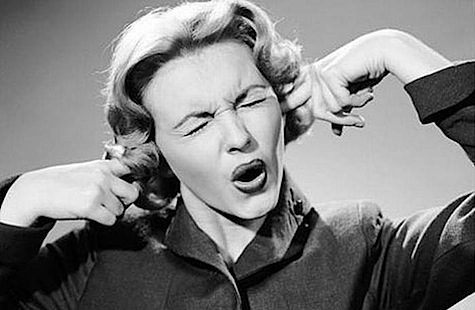
So. Dear white people, please try to hear this: Spike Lee and other American nonwhite, radical artists and intellectuals aren’t anti-white. They’re not out to kill white people. If they were, they would go to Kmart, buy some guns and go out in a blaze like any of the other mass killers in recent memory. It strikes me that Spike Lee, like other humanists in the tradition, is seeking to humanize people who have been made something less than human by our having been force-fed a perspective on the world that always always always places ourselves and our interests directly in the center and relegates the ideas, traditions, and lives of nonwhite people to the margins.
If Spike Lee’s ideas about gentrification are jarring and difficult for you to digest, that’s fantastic news. THAT’S EXACTLY THE FUCKING POINT. Here is a man who’s made a career out of grabbing you by the face with both hands, and not-so-gently turning your gaze towards the things that you don’t want to see but which are nonetheless very real despite the fact that they exist outside of your normal, everyday field of vision. Spike Lee asks us, invites us, challenges us, screams at us to look at what is happening at the margins.
So that uncomfortable feeling that you’re experiencing, that feeling of indigestion that you get when you allow yourself to stop being a self-absorbed asshole for 60 seconds and truly consider the legitimacy of another human being’s anger and frustration, well that right there is your opportunity to grow. You’re welcome. But don’t thank me, thank Spike Lee.
Michael Angelo Tumbarello (aka Baje One) is an armchair cultural critic and a real-life cultural contributor. He was born and raised in Brooklyn, NY.



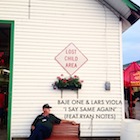

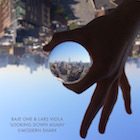




Word up.
Michael, great piece . Both you and Spike are correct. And nearly all critics of his comments really missed the point. BUT where I take issue with Spike is how he can have this critique, this “rant,” and at the same time has been and continues to be a supporter of Ratners super gentrifying luxury suites and luxury condos project which tore up the neighborhood and will only accelerate what he’s bemoaning. It’s a shame he’s been on the wrong side of that one.
Excellent post about something that I deal with on a regular basis.
Allow me to share an example: I’m a white Manhattanite who works in Brooklyn. After-school programs for teenagers in North Brooklyn – perhaps the most spotlighted area of Brooklyn in terms of gentrification.
Last summer, as is often the case due to the nature of my work – I attended a community board meeting that addressed community arts programs, after-school programs, and some real estate development issues. Par for the course. It was a well-attended affair, mostly made up of long-time brown and black residents.
On the very same day – I shit you not – one of the “artist communities” in Bushwick (those cavernous ugly loft buildings populated almost exclusively by white twentysomething hipster types) held a “community” meeting to address how recent high-end real estate development was impacting Bushwick’s artists, and what they could do about it.
At no point prior to their meeting did the Bushwick artist group even consider that there were existing community organizations – with long established infrastructures and connections – with whom they could ally. It did not even cross their mind to reach out to the existing community. Why? Because the existing community groups are mostly made up of Latinos and Blacks. There is so little regard on the part of the newcomers toward those already here that the hipsters preferred to organize their own circle jerk than to even inquire with existing community groups about mutual interests.
As stated above, I am a Manhattanite (born and bred), so one could say I have no dog in the fight. But it still burns to see shit like this happen. And it happens a lot (a film festival in Williamsburg is another culprit, but I won’t go into that story). The new residents really do act as though they moved into some uninhabited desert, and it’s no surprise that we’re starting to see the rumblings of a backlash. Frankly, I’m surprised it took this long.
I’m with you on 99.99 percent.
I’m with you on the audacity of television taught, inexperienced and unoriginal elitists actually believing they’re cultural superior to the people born in the zip codes they’re buying up simply because they have the scratch to do so. I resent their mistaken belief that an absence of obscene wealth, or at least the desire for it, always constitutes a deficiency of character and not a humble and philosophical choice. (Money worshipers: It may come as a shock but there are real live Americans out there who are content with maintaining a merely decent lifestyle and aren’t the slightest bit concerned about keeping up with you. Some of them live in New York, and your presumptuous condescension ranks highly among the reasons they fantasize about fucking you up.)
I’m with you about feeling like a double-agent. As a fellow white man raised in working class New York (albeit from a temporarily less marketable borough) I know not only the aggravation of being taken by the gentrifier as an accomplice in their fucked up fellowship, but also the difficulty of being perceived by generations-deep locals as a privileged invader.
So I come to the .01 percent where I’m not with you. Race is too simple a dividing line, and it doesn’t apply anymore. The steamroller will flatten anyone in its way, regardless of creed, culture or color. More importantly, the working people of the world stand to lose far too much by being further divided by the ancient trick of “we don’t look the same, we must be different.” That’s how they keep us weak and at one another’s throats. (See Blue Collar, Paul Schrader, 1978, which you probably have already).
I have lived in the East Village, and I have lived in Williamsburg. I have worn flannel shirts in both neighborhoods. Given my life experience I have identified more with my Dominican neighbors in either area than with any of the self ordained cool kids from the 800 area code out there in the hinterlands. In fact, my open conversational contempt of these fools put me into relative isolation, underscored by the fact that the race line is too broadly perceived as the one that matters.
Content of character isn’t as easy to see as color of skin, but it’s time for everybody to look a little more closely at one another for what counts, if only because I once considered my native south Queens utterly ungentrifiable, and last night I met some smug business owner from suburban Maryland who’s looking at houses on my mother’s block.
As a long time fan of the Junk and the whole Modern Shark fam, I’m compelled to agree with you and give you a dose. Both/And always, isn’t it?
It just strikes me as navel-gazing and yeah-yeah them-not-me-though. To distinguish yourself from your peers. As slightly more authentic than those whom you criticize, but not distinct enough to exempt yourself from the critique. Maybe I didn’t read your caveats as being as sincere as I’m sure you intended them to be. I’ve been on a nostalgic streak with the raps lately. I know you’re well familiar with Ill Bill, the non-phixion days and his more recent endeavors. Those are real critiques from the hood. Some true scholarship with a basis in experience.
So pardon if you’re critique strikes me as navel gazing and seems more like an attempt to differentiate yourself from the true targets of your critique. As one of the good ones. I only bother to write this because I identify more closely with you than others. Every time an issue of consequence comes up in conversation (so rare!) I’m always compelled to encourage my interlocutors to examine what they’re taking for granted. What we take for granted is the foundation of our dialogue, no? So, while I identify with your critique, I think a less reactionary critique might have packed a stronger punch.
I only write this out of respect for all of your output over the years. It just strikes me as reactionary and navel gazing. Perhaps a few days’ reflection would have suited you better. You are spot-on in your critique of the strangers who’ve come to town. But, I would posit, You might come across as wiser and less reactionary if you’d spent more time on the substantive issues that you glossed over and less time differentiating yourself from the subjects of your vented spleen.
I say all of this with zero hate. Simply as a fellow navel gazing white individual with a fully justified mound of guilt to sift through.
I wrote this hastily and did not edit. Best wishes, J.
Where do you and Spike Lee find issue with gentrification? Is it the improvement in standards of living? Is it because the cultural makeup of the neighborhood has changed? Is it because new businesses open and some locals can’t afford to buy what they’re selling?
Change is a fact of life, and essential. If you aren’t growing, you’re dying. Detroit hasn’t changed in years, and take a look at how well that city is doing. Don’t you think they could stand for some “gentrification?”
I’m white, lived in Brooklyn my entire life. My neighborhood–Manhattan Beach–changed completely over the course of my lifetime. When I was young it looked like a bungalow colony, with most houses only having one floor, and most of my neighbors spoke exclusively English. Now every house on my block has been totally remodeled into a huge monstrosity, and their occupants are almost exclusively Russian immigrants. There are days when I can go for a walk without overhearing a single conversation in English.
It’s too bad for me that my neighborhood isn’t the sepia-toned piece of Americana that I remember from my childhood, but so what? “Gentrification” is not exclusively a white/non-white issue, so I don’t see the relevance of bringing up your race. And as for the change in character of a neighborhood, why should anyone want a totally static community that insulates itself from the outside world?
You say you’re not criticizing anybody or judging the “hipster” for wanting to move in, but then you passive-aggressively lambaste people as dwelling in “prisons of our own limited perspectives.” By what standard is somebody’s perspective limited? Should the “hipster” ask themselves whether there is a single soul who might–after some long, Rube Goldberg-esque sequence of events and macroeconomic developments–be impacted negatively by their moving in to a neighborhood? Should the “hipster” reconsider moving in if it means that some neighborhood business will be replaced by another business?
If I have to move out of a neighborhood because I can no longer afford to shop at the grocery stores, then that sucks for me. But the world–or in this case, Brooklyn–doesn’t revolve around me!
You accuse the new Brooklyners of being self-absorbed, but isn’t it the height of self-absorption to people who move into a neighborhood should keep their ears open at all times to the grievances of people disgruntled at their presence? The world does not revolve around the people of old Brooklyn, and having lived in a neighborhood for any number of years longer than someone does not entitle one to exclusive jurisdiction over the character of that neighborhood. Tradition and “the culture” are not the forces which bind a community—it’s simply a question of who lives where.
And you don’t seem to have a clue about the housing market in New York. A “runaway housing market with next to no regulation”? Are you kidding? New York real-estate is some of the most highly regulated in the country. And more rent controls would help? Have you ever studied basic economics? The effects of rent-control are very, very well-known. In New York, it means that there’s a large homeless population and an equally large number of empty apartments. Price controls distort everything and create shortages (or excess surplus)—it’s historical record at this point.
And “we live in an advanced capitalist society based on Social Darwinism where the winners are taught to never apologize?” Who are the losers in the transaction between the hipster and the real-estate agent or landlord? The landlord gets paid for the use of their property, and the hipster gets a chance to start a life in Brooklyn. If you aren’t either of those people, then you have nothing to do with this “advanced capitalist” society, and it’s none of your god-damned business.
People who disagree with Spike Lee’s rant aren’t upset about a racially charged issue–they’re upset that Spike Lee is a bitter old xenophobic traditionalist. Let’s no get started on his ridiculous comparison between gentrification and Columbus—people have been essentially burned at the stake by the media for much more innocent and innocuous comparisons. His hyperbole aside, Lee’s remarks are probably very similar to remarks that people in New York were making back in the late 19th and early 20th century, as immigrants from Ireland, from Italy, from Germany, and China were rushing into this city.
It’s not “gentrification,” it’s change. Get over it.
As a 30+yr. resident [white] of Harlem married to a black guy who I met here (he has the eyes of my father, a velvet voice, and passionate social ethics like mine); I can identify with the frustrations voiced here. We own a brownstone which we bought from our landlord–the last best deal in Harlem we say. We could never buy it now, and only got it back when by the skin of our teeth. I hear Spike loud and clear and all the rest of you. We too sometimes long for the old days when, yes, drug dealing was rampant, vacant lots and crumbling buildings were the norm, but we knew every neighbor, even heroin addicts looked out for me when I came home in the wee hours from my restaurant job. When a crackhead mugged me on 125th street I ran after him into my block and the guys here jumped him and got my stuff. We too have a new neighbor who told me, “It’s a new Harlem! You people have to get with the program!”
And, yes, folks have come here too acting like this is an uninhabited desert where they can stake their claim. There are newbies who think they’re “Harlemites” because they’ve lived here 10 years; they’ve tried to shut down cook-outs(in front of our buildings) and block parties(too much noise) and drummers in the park. There’s good, there’s bad, there’s ugly. Sadly, some of the best Mom & Pop businesses have gone. Still, we’re trying to focus on keeping what was always good and authentic, remembering the “movers and shakers” who were indeed here long before gentrification settled in, build on what we learned from them, cultivate that good and grow more of it. No one can stop change–but we can all help to shape it by remaining true to ourselves. .
Thank you. It is such a shame that it takes white people with money to come in before the cities care about its residents. Spike Lee’s point is that if you’re moving into these areas, stop doing it with the intention of making it a white utopia. It already has a history and as white people, we’re not a part of that. It’s ok for us to not have been a part of something. Respect that, embrace the culture. His comparison to colonization is totally appropriate. While colonization brought some benefits, it mostly stripped away culture, identity, and history.
Whether we admit it or not, the fact is that the US still sees white people, especially white men, as leaders, bringers of change, and voices of authority. If you understand what a privilege that is, use that for something that’s good for more than just yourself. There’s a lot we can do by lending a voice and a hand instead of taking over the whole job ourselves and reinventing the wheel in white. If anything use your whiteness to get the stuff done that politicians and police wouldn’t look at before.
As a native Brooklynite who grew up in East Flatbush and now lives in a condo full of “gentrifiers” in South Williamsburg, I don’t see gentrification as a bad thing in and of itself. The commentator who said “it’s change. Get over it.” in my eyes summed it up the best.
My parents migrated to Brooklyn in the 70′s from the West Indies to make a better life for themselves. They moved into better neighborhoods as they achieved their American dream. It’s ironic that as they moved into predominantly white neighborhoods that they experienced the opposite issue expressed in this article… in the 70′s it was called “white flight”. A phenomenom where seemingly overnight neighborhoods went from mostly white, to mostly black and as a result home values fell. Some might say what happened to those good old days?
My point is that this is what makes our city great. It breathes, it lives, neighborhoods change, people try to get along with one another with varying degrees of success. It is this dynamic, this ebb and flow that makes NY the multicultural melting pot that it is. I am not saying that we all have to hold hands and sing Kumbaya, I am saying that as a native Brooklynite who is living in a gentrified building in the heart of South Williamsburg trying to live the American Dream on his own terms, that our capitalist economy does and will work itself out (Oh yeah I said the bad “C” word, show me a better system (one that actually exists)).
As a side note, I was also the editor for a documentary directed by Nelson George based on this very topic called “Brooklyn Boheme” in which Spike Lee expressed these very same views. That documentary also featured Rosie Perez, and in response to all the gentrifiers who she thought were ruining her way of life, she said. ‘I will ride it out, another cool neighborhood will come along and they (the gentrifiers) will eventually move out.’
Finally, I’ve also know and have interviewed Baje One (the author of this article). I am an admirer of both his music, his writing and his Brooklyn Roots which go far deeper than mine. What’s up Baje!? I’d like to say to you thanks for continuing this discussion. Dialogue is always good.
Trevz
Trevz after reading all of that and knowing this author you just say get over it? Sad but not shocking. West Indians I know always do this. Learn your color honey.
Gentrification would be ok if they did not displace the lower income dwellers. When they raze a building they can add but not remove. I have seen this problem cause in Queens Jersey City Theatermania Row NYC and Brooklyn. The way it works now it only benefits upper half of society at best. At worst just the Trumps and Bloombetgs.
I have been struggling with Spike Lee’s rationale that “we were here first” when in fact the history of Brooklyn, Bushwick, and even harlem preceed the African-American era by almost 300 years. In the 1600′s these areas were all Dutch settlements, so by that logic is it really is it the Dutch who have been displaced all these years?These neighborhoods have gone through several phases of cultural settlement. America is a melting pot, and culture is dynamic and by nature will change, so I think that the sentiment to want things to stay the same is just that, a sentiment.
To me the bigger issue is the systematic oppression of those in poverty in society. Sometimes this aligns with racism, but not in all examples. Access to safe living conditions, stable homes, access to education and healthcare, adequate food, clothing, and shelter should be basic tenants of American living, but they are not. While it is easy to point to point out these issues, I have no solution, and seemingly neither does anyone else. But what I do know is that hipsters are not helping this problem at all, they are just helping themselves to new ‘vintage’ fashions, gourmet ironic foods, and whatever next thing THEY discovered first (craft beers….yeah right).
I truly cannot stand hipsters, I intentionally live on the margins of town to avoid them, I am living in Austin, Texas and the same thing is happening here. The east side of Austin used to be predominantly an African American community, now it is the site of handlebar muschtaches, ironic pubs serving over-priced pabst, and fixed gear tatted up cyclists who are all so ‘unique’. Why anyone wants to be associated with the hipster movement I will never know, but I am glad they contain themselves to a neighborhood where they can all express how cool they are too each other and I can easily avoid that patch. Will the fad fade away? I certainly hope so. Do they feel bad for displacing families and communities? No – they totally got a rad new apartment in a gated community in the city.
I think Spike Lee’s argument could have just been hipsters suck. I think this is an issue that could unify all races, who are all just trying to make a decent living in this crazy world. Hipsters are a culture of self-absorbed bratty suburbanites who want to build a culture of self-worshiping and all you have to do to join is make yourself look totally un-f**kable and act like an arrogant ass all while mooching off of your parents to pay for an over-priced apartment well into your 40s.
Alls I know is, so much of Brooklyn used to be a war zone where you just didn’t go, ever. Now the whole borough is safe, thriving and filled with douches. I hate douches too, but I hate violence and getting mugged a helluva lot less.
Bravo my friend bravo, beautifully stated!
Some of the people who present the “gentrification is change” argument fail to cede some elements of truth to Spike Lee and his supporters here. The main example that I would present here is the destruction of the Fulton Mall shopping area, which has been decimated by the Bloomberg administration’s development policies. This area was driven by many successful small businesses who catered to lower and middle income clientele (largely African American and New York Latino). These businesses were predominantly owned by “non-white” New Yorkers. The aesthetics of the mall were not appealing to many of Brooklyn’s newer and more “upscale” residents, nor to the Bloomberg administration. Through Thor Equities, the area is now becoming one of those glass condo zones and the retailers that are coming in to replace the original businesses are national retailers like Benneton who cater to the people who are buying the new condos. I agree with Spike Lee that this type of change is destructive and ultimately at its core, racist. There had to be a more creative way to do this, in which newer interests were served and the existing businesses and their clientele supported. Some of it is no doubt racism, but another element is laziness and the petty pursuit of “might is right” economic gain.
[...] 1. Diggin’ In The Files: A Tribe Called Quest. A short retrospective on Tribe’s career via print articles from the Bill Adler Hip-Hop Archive. [Crazy Hood] 2. An Open Letter to Everyone But Mostly to White People. The “Christopher Columbus syndrome” mentioned in Spike Lee’s well-publicized gentrification comments is real according Junk Science emcee. By Michael Angelo Tumbarello aka Baje One. [Modern Shark] [...]
I don’t have any issue with what Spike said. But maaaaaaaaann, he should’ve left Old Boy alone.
And as for the change in character of a neighborhood, why should anyone want a totally static community that insulates itself from the outside world?”
I don’t get it. aside from the hasidic parts of town which neighborhoods are insulating themselves from the outside world? How was pre-gentrified bed-stuy, bushwick, sunset park insulating itself beforehand? brooklyn heights hasn’t changed for the past whatever, is that neighborhood insulating itself? Is Carrol Gardens insulating itself from the outside world?
Being in brooklyn all my life I can’t really decide where I stand on this issue. The facts are that schools are going to get better, property value will go up, crime will go down, new business will open. But it comes at an expense. Personally, i would feel better if people just showed their true colors and came out and said they dont care about what happens to poor people.
I always notice that people will lump the early irish, italian, jewish, immigrants as gentrifiers. Those early immigrants weren’t displacing anyone, and they weren’t causing landlords to improve conditions, schools weren’t getting better etc., etc., etc.
I would like to add one last bit of blabber that isn’t about the topic at hand. Don’t you notice that people try to label the entire borough as whatever characteristics their own neighborhood is? like people will say oh theres so many good restaurants and shopping.. If you live in midwood, kensington, you’re not saying that crap. or people saying there so many young artists here, blahblah.. If I said yo brooklyn is crazy hood, it just aint safe, don’t go out after dark, everyone would say no you’re wrong or say no, just some neighborhoods are bad.
In many ways i agree with you. My family has been in NYC since 1848. We moved a few times from Lower East Side to Williamsburg and now Queens. But we’re still here. i ran for public office and lost, worked in east Harlem and volunteer time there as well (which is being gentrified like hell) and taught in one of our best public high schools for years. My family and I have seen it all one might say. It is true artists, hipsters, and other gentrifiers have an artificial arrogance that is more than annoying. And as you bring up they come with enough guaranteed money from mom and pop and stocks,bonds, etc. that they have no idea of community. You gave Columbus a Bad rap. Maybe so – but read his logs and letters
and see what he really saw and said about the native peoples he first met. I wish we would get at least that amount of respect. The problem with Dspike Lee is that he is the problem. Why did he have to move to move to upscale digs in Manhattan. he believed in the neioghb orhood and community he had more than enough of the resources to ehlp build it up before the outsiders came. Did he go to ommunity board meetings in Fort Greene? Did he start programs like music, arts, and drama for kids on his block and in the “hood”? Maybe he did but why keep it so secretive?. I have friends from Bushwick from years ago who started a program every friday night and on weekends at Holy Cross Church and later at St. Bridget’s- the Coastal Patrol cadet Corps. Even when some of them moved to Queens or out to Long Island they came into Bushwick every weekend and helped kids get a love for country, for family, for neighborhood and most importantly for themselves so they could succeed in school, many go onto college and meaningful life careers. People I work with in east Harlem and have done so for over 30 years through the NYC 25th Precinct Gladiators led by Mike and Negra Rosario do the same. None of us had the resources that Spike has except we had heart and commitment
to our roots and to the future of these neighborhoods and the next generations.
The issue here is wealth and social class, not race.
[...] wonder, as I did in my last piece, why are we as white people so invested in robbing black Americans of their right to feel and [...]
Brooklyn NY is seeing more whites moving in and blacks moving out, the crime is lower due to the low income blacks who left Brooklyn not just because of a more police presence in the area. The people who left Brooklyn were trouble makers.Most of the whites moving in are college educated people not committing crimes
that’s the simplest thing I’ve read in weeks.